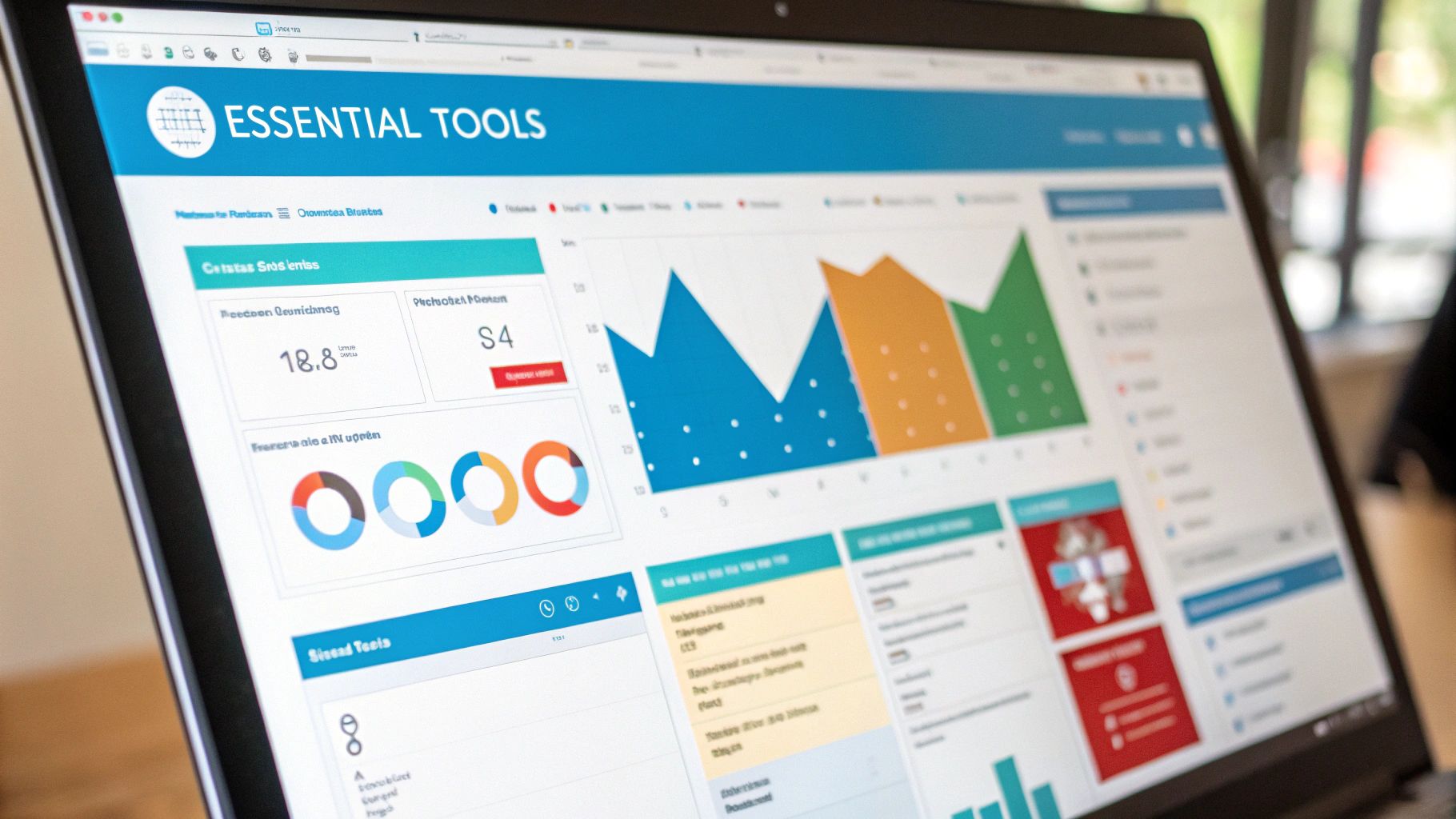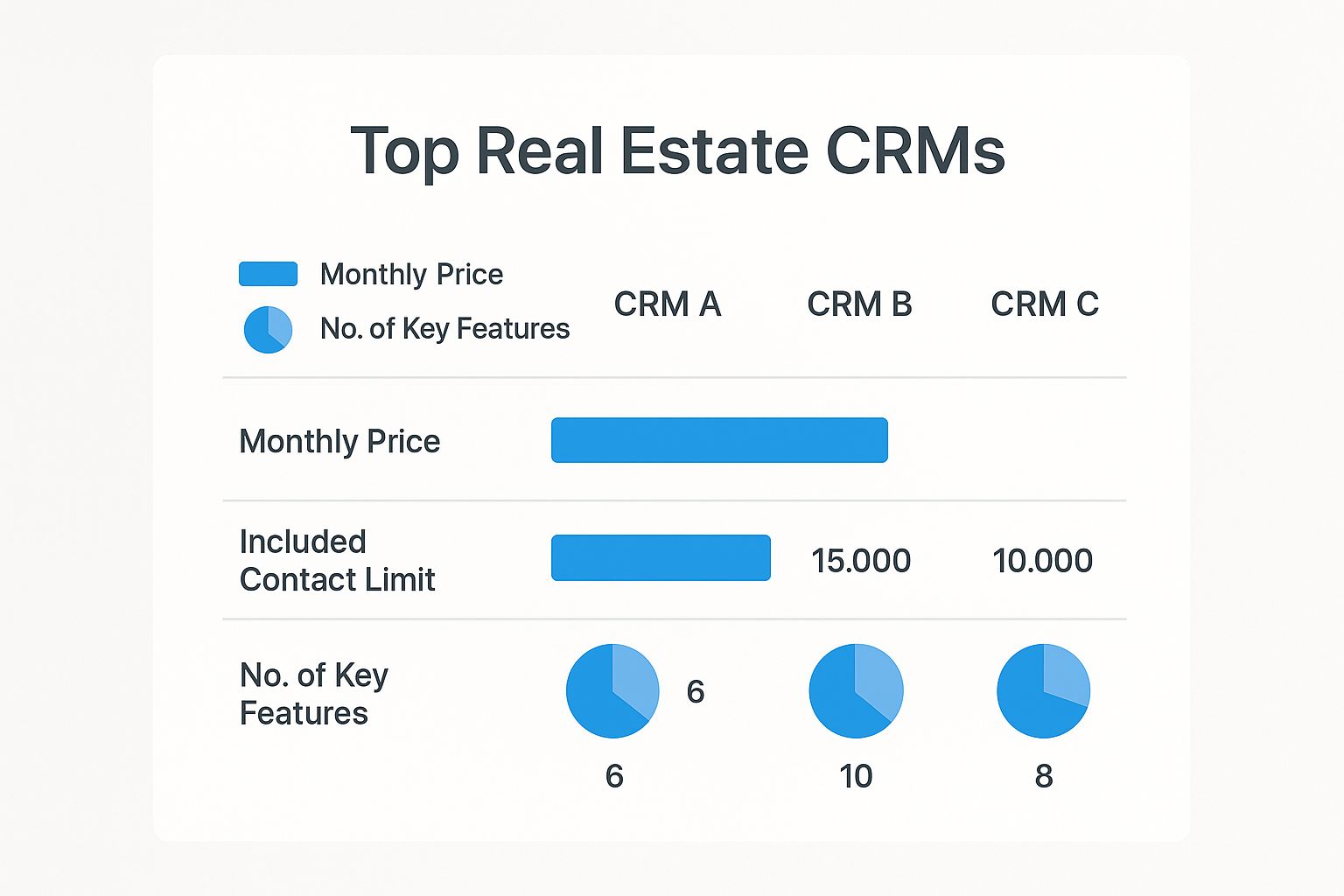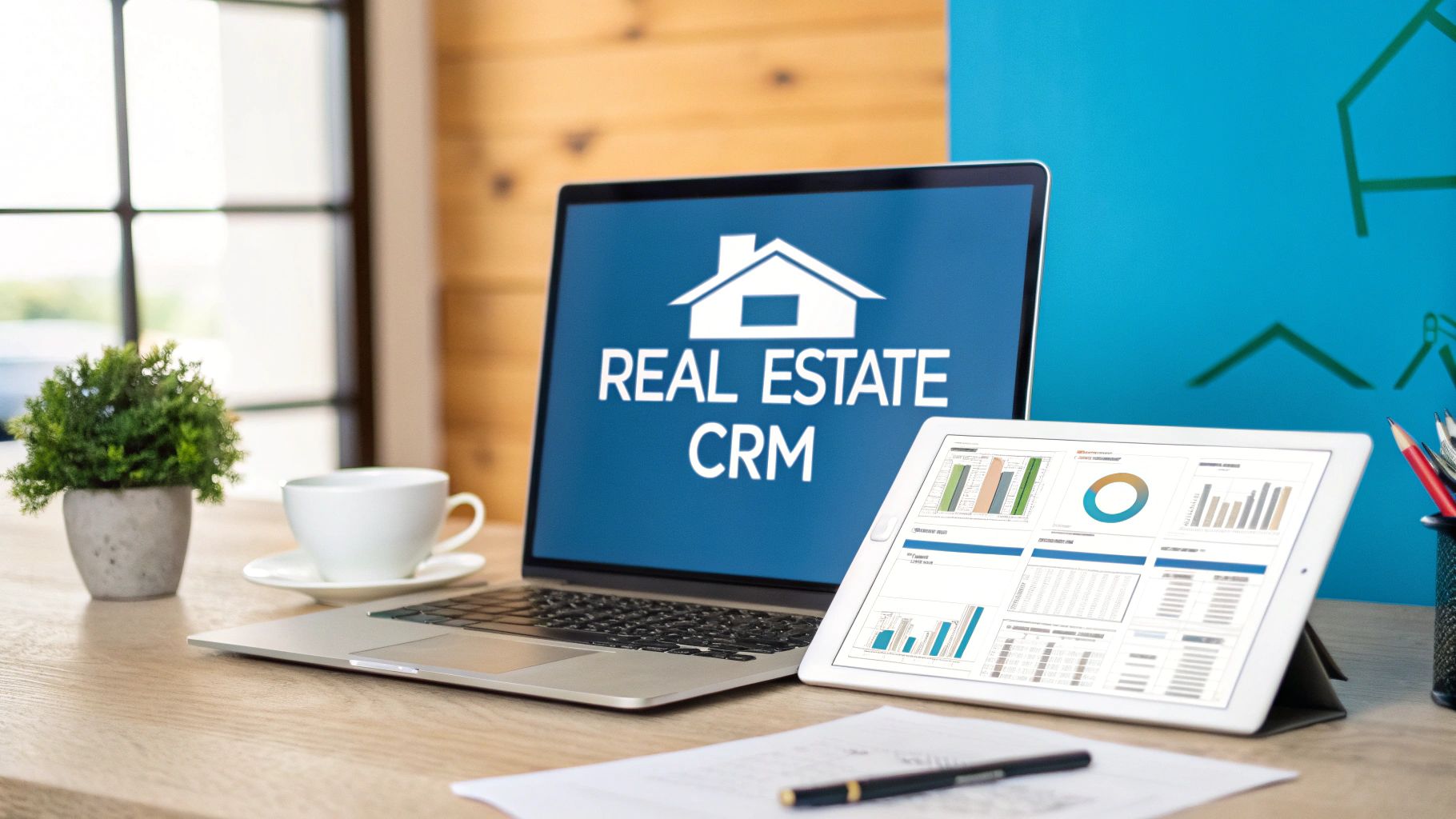For property management companies managing 100 to 10,000+ units, finding the best CRM for leasing operations isn't just about picking software; it’s about architecting a system that plugs the leaks in your leasing funnel. Are you drowning in tenant leads you can't respond to fast enough, leading to higher Days on Market (DOM)? Or are you struggling to convert inquiries into scheduled tours? Specialized leasing platforms like AppFolio, Buildium, and Entrata were built for this, offering tools that generic CRMs can't match for scaling property management.
Getting this right directly impacts your Net Operating Income (NOI) by automating tedious tasks, accelerating your speed-to-lease, and keeping your leasing pipeline full and moving.
How to Choose a CRM That Actually Scales Your Portfolio
Think of a leasing CRM as the engine of your property management operations, not just a digital Rolodex. The right one doesn't just store prospect data—it orchestrates your entire leasing process, from lead capture to lease signing. It automates follow-ups and provides the critical data you need to reduce vacancy rates. For large portfolios, that means less time spent on manual coordination and more time focused on strategic growth and improving cost-per-door efficiency.
This guide will cut through the noise and give you a clear framework for making a smart, scalable decision. We'll break down top options based on what enterprise-level property managers really need:
- Multi-market portfolios requiring standardized processes
- Growing PMCs that need scalable systems for remote operations
- Established enterprises focused on KPI optimization and cost reduction

What an Enterprise Property Management CRM Should Do
A purpose-built property management CRM is designed around the unique, high-volume workflow of leasing. And while most CRMs handle basic contact management, a system for a large portfolio must excel at speed and automation. (For more on that, check out our guide on the https://www.showdigs.com/property-managers/the-7-best-leasing-crms-for-your-property-management-business).
The real differences become clear when you look at the top platforms side-by-side. Each one has its own strengths, catering to different operational priorities, from aggressive lead-to-tour conversion to long-term resident retention.
A CRM isn't just for managing today's hot leads; it's for building a predictable leasing pipeline for tomorrow. Every day a unit sits vacant directly impacts revenue. The goal is to create a system that minimizes DOM and maximizes lead-to-tour conversion rates.
To keep a pulse on what's next in PropTech, it's always smart to look at other industry resources. You can explore the Titletrackr blog for industry insights to stay ahead of the curve.
Think of this as your roadmap to choosing a platform that truly becomes the cornerstone of your scalable operations.
Why Generic CRMs Fail at Property Management Scale
A generic, off-the-shelf CRM might seem like a practical first step. But for a growing property management company, it quickly becomes an operational bottleneck. These platforms are built for a universal sales process, which means they treat leasing a unit the same way they’d treat selling a software subscription. That fundamental mismatch creates friction right where you need seamless automation, costing you time and, worse, qualified tenants. Every lost lead is another day of vacancy, directly impacting your portfolio's revenue.
Think about it: a standard CRM doesn't speak the language of property management. It has no built-in understanding of unit availability, tour scheduling logistics, or the rapid-response nurturing needed for a renter who’s ready to move now. Operations teams end up patching together clumsy workarounds, spending more time fighting their software than actually reducing Days on Market.

The Problem with a One-Size-Fits-All Approach
The journey of a prospective tenant is unlike any other sales cycle. It's fast, competitive, and involves multiple stakeholders—leasing agents, prospects, and operations managers. A generic CRM just can’t keep up with these moving parts at scale.
- No Industry-Specific Fields: You're stuck manually tracking critical details like desired move-in date, pet information, or application status in generic "notes" fields. This makes meaningful automation and reporting nearly impossible.
- Zero Leasing Pipeline Visibility: These systems lack the visual pipelines designed specifically for the lead-to-lease journey, so you can't see at a glance where every prospect is on their path from initial inquiry to signed lease.
- Clueless Automation: Their automated campaigns are made for B2B sales funnels, not for sending automated tour confirmations, follow-ups after a showing, or application reminders.
A purpose-built property management CRM isn't just a fancy address book; it's the operational hub for the entire, high-velocity lifecycle of a rental unit. It transforms your prospect list from a static spreadsheet into a predictable, scalable pipeline for minimizing vacancy loss.
Why Specialization is a Revenue Driver
Switching to a property management-specific platform isn't about convenience—it's a strategic move that hits your bottom line. The global real estate CRM market is on track to blow past $15 billion by 2025, and a significant portion is driven by the demand for specialized property management solutions. This explosion is fueled by the need for data-driven insights that generic systems simply can't deliver. You can learn more about the rapid expansion of this market here.
When your CRM is built from the ground up for leasing, you unlock powerful capabilities. You can automatically syndicate listings, trigger follow-ups based on a prospect’s viewing activity, and manage your entire leasing checklist from one dashboard. This kind of deep integration is what separates the good from the great when you're looking for the best crm for property management at scale. It turns a passive database into an active, revenue-generating machine. Without it, you're essentially operating with one hand tied behind your back in a fiercely competitive rental market.
A Head-to-Head Comparison of Top Real Estate CRMs
Picking the right CRM isn't just about ticking off features on a list. It’s about finding a system that plugs directly into your leasing operations and scales with your portfolio. To really figure that out, you need a straight-up, objective look at how the top platforms actually perform for property managers in the trenches.
We're going to break down four of the biggest names in the industry: Follow Up Boss, LionDesk, Top Producer, and Wise Agent. Instead of just reciting their marketing copy, we’ll evaluate them on what truly drives a property management business forward—lead management that reduces DOM, automation that converts leads to tours, and analytics that optimize cost-per-door.
This side-by-side view gives you a quick snapshot of how these platforms are positioned in terms of cost and scale.

As you can see, there's a clear trade-off between price, features, and the size of the team each platform is built for.
Follow Up Boss: The Team Collaboration Powerhouse
If you run a fast-moving leasing team or brokerage, you’ve probably heard of Follow Up Boss. Its entire reason for being is to master speed-to-lead. The platform is built from the ground up to make sure every single rental inquiry is assigned and acted on in minutes, not hours—a critical factor in reducing vacancy days.
It pulls in leads from over 200 sources like Zillow and Realtor.com into one clean, manageable inbox. This alone is a lifesaver for large portfolios, but where it really shines is in giving leasing managers a crystal-clear view of agent activity, response times, and overall lead-to-tour conversion rates.
Follow Up Boss is less of a simple contact database and more of a central nervous system for a leasing team. Its entire design philosophy is built around converting leads through rapid, collaborative action, making it ideal for teams that prioritize accountability and speed-to-lease.
A few things that make it stand out:
- Action Plans: These aren't just basic drip campaigns. They're sophisticated, customizable sequences that can mix emails, texts, and automated tasks for your leasing agents to ensure no lead goes cold.
- Agent Dashboards: Everyone on the team knows their numbers. Dashboards give you instant visibility into call volume, follow-up rates, and other KPIs that directly impact DOM.
- Robust Integrations: It plays nicely with almost every other tool in the real estate tech world, cementing its place as the hub of your leasing operations.
LionDesk: All-In-One Marketing and Sales
LionDesk’s angle is to be the all-in-one command center, especially for property managers who want their CRM and marketing automation under one roof. Its big claim to fame? The native video email and text feature, which is a fantastic way to send personalized, engaging messages—like a virtual unit tour—that stand out in a crowded rental market.
It also comes with a built-in "Power Dialer," letting you fly through your prospect call lists without ever leaving the CRM. This heavy focus on direct communication tools makes it a solid pick for PMCs whose business is built on high-volume prospecting and relentless follow-up to fill vacancies quickly.
While it has a broad set of tools, LionDesk really hits the sweet spot for solo property managers or smaller teams trying to consolidate their tech stack and manage everything from a single platform.
Top Producer: The SOI Nurturing Specialist
Top Producer is one of the original real estate CRMs, and its longevity comes from a laser focus on what it does best: nurturing your sphere of influence (SOI). For property managers, this translates to building relationships with property owners and investors. If your business model revolves around long-term client relationships for portfolio growth, this is a platform built for you.
Its key differentiator has always been the Market Snapshot reports. These hyper-local market updates position you as the neighborhood expert and give you a valuable, automated touchpoint to stay in front of current and prospective property owners.
Top Producer shines in its ability to automate the high-touch, relationship-building activities that drive owner acquisition and retention. It’s built for the property manager whose business model is centered on being the go-to expert for their community over the long haul.
While some newer platforms might have a slicker interface, Top Producer's deep, time-tested features for client retention are still incredibly powerful for PMCs building a sustainable, referral-based business.
Wise Agent: The Feature-Rich Value Leader
Wise Agent has earned its reputation by packing a ton of functionality into a platform that won't break the bank. It's a popular choice for property management teams who need a bit of everything without the hefty price tag.
It’s the workhorse of the group, offering a well-rounded set of tools that cover contact management, marketing, and even transaction coordination for new owner onboarding.
Here’s where it really provides value:
- Landing Page Builder: You can create lead capture pages for available units or owner-facing promotions right inside the CRM, no separate subscription needed.
- Transaction Checklists: These are highly customizable templates to help you manage every step of the leasing process, from application received to lease signed.
- Integrated Marketing Tools: It has everything you need to send newsletters, property flyers, and bulk text alerts to prospects or owners.
For a deeper look at other must-have tools, check out our guide to the best software platforms for real estate agents. Wise Agent delivers serious bang for your buck, making it a strong contender if you need a versatile, all-in-one solution.
Feature Breakdown of Leading Real Estate CRMs
To make sense of it all, it helps to see the core features laid out side-by-side. This table breaks down what each platform offers in the areas that matter most to property managers every single day.
Ultimately, the best choice really boils down to your specific operational priorities and how you want to scale your portfolio. Research shows that 94% of CRM users prioritize contact management and 88% want interaction tracking. But for property management, the real game-changer is automation, which a staggering 98% look for in a platform to accelerate the leasing cycle.
Which CRM Actually Fits Your Business?
Choosing the right CRM isn't about finding the one with the longest feature list. It’s about matching a platform’s core philosophy to your actual business model and daily operations. The best CRM for a small property manager who lives off owner referrals is totally different from what a high-volume, multi-market portfolio needs to juggle hundreds of tenant leads.
Let's move past the abstract feature comparisons and get into clear, situational recommendations for property management companies. By looking at how these platforms perform in the real world, you can pinpoint the one that will become a genuine asset for reducing DOM and improving efficiency—not just another monthly subscription.

For the Solo Manager Focused on Owner Relationships
If your business is built on relationships with property owners and investors, you need a CRM that’s a master of long-term, high-touch nurturing. You don't need complex lead routing for tenant leads; you need a system that makes sure no property owner ever feels forgotten, driving retention and referrals.
- Top Recommendation: Top Producer
- Why it Fits: Top Producer was practically designed for this exact model. Its standout feature, the Market Snapshot reports, gives you automated, valuable content to stay top-of-mind with owners. It cements your status as the local market expert, strengthening the very relationships your business relies on for growth.
For the Small Team Needing Lead Routing and Accountability
The moment you grow from a solo PM to a small team, the game changes. The biggest challenge isn't just nurturing contacts anymore—it’s making sure every single inbound tenant lead gets captured, assigned, and actioned immediately. Accountability is everything, and you need a central command center to manage the speed-to-lease process.
A team's success hinges on its systems. When a tenant lead comes in, the clock starts ticking on vacancy costs. The best CRM for a leasing team provides the structure to ensure rapid response times and complete visibility into who is doing what, turning potential chaos into a predictable leasing machine.
- Top Recommendation: Follow Up Boss
- Why it Fits: Follow Up Boss is the undisputed champ in this arena. Its entire platform is engineered for team collaboration and speed-to-lead. The lead routing is second to none, letting you instantly assign tenant leads based on property, zip code, or a simple round-robin. Plus, the agent dashboards give managers a clear, no-nonsense view of performance, making it easy to track response times and ensure no leasing opportunity slips through the cracks.
For the High-Volume Manager Focused on Automation
Are you a PMC that invests heavily in online lead gen from sources like Zillow, Apartments.com, or social media ads? Your success lives and dies by one thing: automation. You need a powerful system that can handle a massive influx of leads, qualify them, and engage them instantly with texts, emails, and even video messages to schedule tours before competitors do.
- Top Recommendation: LionDesk
- Why it Fits: LionDesk is an automation beast built for the modern, high-volume property manager. Its native video texting and Power Dialer are designed to engage leads at scale in a way that still feels personal. You can set up sophisticated drip campaigns that automatically nurture hundreds of prospects at once, freeing you to focus only on the prospects who are actually ready for a tour. For a PMC whose model is all about converting a large volume of internet leads into signed leases, LionDesk is the all-in-one toolkit you need.
For the Brokerage Seeking an All-In-One Solution
A property management brokerage needs something that goes way beyond lead management. You need to cover the entire operational landscape—leasing coordination, marketing, and agent management—all inside a single, scalable platform. The goal is to give your team the tools they need to succeed while maintaining oversight and process standardization at the brokerage level.
- Top Recommendation: Wise Agent
- Why it Fits: Wise Agent packs an impressive all-in-one feature set into a price point that makes sense for growing brokerages. It offers robust transaction management checklists for leasing, a built-in landing page creator for vacant units, and a full suite of marketing tools. This allows a brokerage to provide a standardized, feature-rich platform to every agent, ensuring consistency and efficiency across the board. It’s the ideal blend of functionality and value for brokerages that need a comprehensive system without an enterprise-level price tag.
Calculating the Real ROI of Your CRM Investment
When property managers start looking for the best crm for real estate, the conversation usually begins and ends with the monthly price tag. But that's the wrong way to think about it. A good CRM isn't an expense—it's a profit center. The real question isn't what it costs, but how much revenue it generates by reducing vacancy.
To figure that out, you have to stop thinking about the sticker price and start looking at the tangible financial gains. Sure, the initial investment might be $49 per month for a solo manager or a few hundred for a team using a platform like Follow Up Boss. But don't forget the other costs that can pop up, like data migration fees or paying extra for essential integrations. Getting a clear picture of the total investment is step one.
Shifting from Cost to Value
The true worth of a CRM is measured by the operational efficiency it creates and the leasing opportunities it converts. To actually calculate its ROI, you need to put a dollar value on three key areas: time saved per employee, increased lead-to-tour conversion rate, and reduced Days on Market (DOM). Each of these feeds directly into your portfolio's revenue.
Just think about all the manual, repetitive tasks your team does every single week:
- Manually entering new leads from Zillow, your website, and social media.
- Sending the same "checking in" emails or texts to schedule tours.
- Digging through inboxes to find a prospect's information.
- Trying to build a report on your leasing pipeline's health.
If a CRM's automation saves your leasing agent just five hours a week, and you value that time at $50 per hour, that’s $1,000 per month in recaptured productivity. That's time they can now spend on high-value activities, like conducting more showings or improving tenant relations.
The most powerful shift in perspective is seeing your CRM not as a monthly bill, but as a system that multiplies your team's most valuable resource: their time. Every automated follow-up that converts a lead to a tour is a direct reduction in costly vacancy days.
A Practical ROI Calculation for Property Managers
Let's run the numbers with a simple, real-world example to see how a CRM pays for itself by cutting down on vacancy.
The Scenario:
- CRM Cost: $150/month
- Average Monthly Rent: $1,800
- Lead Volume: 50 new leads/month
- Current Conversion Rate (without CRM): 2% (that's 1 lease signed per month)
- Average Days on Market (DOM): 30 days
Now, let's see what happens when you add the CRM. With automated lead nurturing and instant follow-ups, your lead-to-lease conversion rate bumps up from 2% to 3%. It doesn't sound like much, but it means you're now signing 1.5 leases a month from the same number of leads. That’s an extra lease every other month, and let's assume it reduces your average DOM by 10 days.
The ROI Breakdown:
- Additional Annual Revenue (from faster leasing): 6 extra leases/year x ($1,800 rent / 30 days x 10 days saved) = $3,600
- Additional Annual Revenue (from more leases): 6 extra leases/year x $1,800 rent = $10,800
- Total Annual CRM Cost: $150/month x 12 months = $1,800
- Net Profit from CRM: ($3,600 + $10,800) - $1,800 = $12,600
- Return on Investment (ROI): ($12,600 Net Profit / $1,800 Cost) = a 7x ROI
And this quick math doesn't even touch on the long-term value of improved owner satisfaction from lower vacancy rates. Industry data backs this up. Some reports show that CRM software can generate an ROI of $30.48 for every dollar spent. You can discover more insights about these CRM statistics for yourself. It’s pretty clear: the right CRM is one of the most profitable investments a PMC can make.
Integrating a CRM into Your Technology Stack
Picking the right CRM is just step one. The real magic happens when it becomes the central nervous system for your entire leasing operation, not just another piece of software. A CRM that stands alone is little more than a digital address book—it quickly becomes a data silo, forcing you to waste time on manual entry and creating gaps in your workflow.
For any property management company trying to scale, seamless integration isn't just a nice-to-have; it's a non-negotiable requirement for operational efficiency.
Your CRM needs to talk to the other tools you rely on every single day. Think about it: your website captures a new lead, that lead instantly pops into your CRM, and a follow-up sequence kicks off automatically. Platforms like Zillow and Apartments.com should feed directly into your pipeline. When an application is approved in your screening software, the prospect’s status should update automatically. That's a frictionless, automated workflow.
Your Actionable Implementation Checklist
A botched CRM launch is a recipe for frustration and low team adoption. You can avoid the chaos by following a structured, step-by-step approach.
- Data Migration and Cleanup: Before you do anything else, pull all your prospect and owner contacts from your old systems. This is the perfect time to scrub your list. Get rid of duplicates, update old information, and segment everyone into useful groups like "Active Prospects," "Past Tenants," or "A-List Owners." A clean database is the foundation for everything else.
- Lead Routing and Automation Setup: Decide exactly what happens when a new lead comes in. Set up rules that automatically assign it to the right agent or property and fire off an instant welcome email or text to schedule a showing. Getting this right is how you master speed-to-lease and make a killer first impression.
- Pipeline Customization: Don't settle for the default pipeline stages. Customize them to mirror your actual leasing process, from "New Lead" and "Tour Scheduled" all the way to "Application Received" and "Leased." This gives you a real, at-a-glance snapshot of your portfolio's health.
- Team Training and Adoption: Book dedicated training time with your leasing team. Walk them through real-world scenarios—don't just show them features. Highlight exactly how the CRM will eliminate their biggest headaches, save them time, and ultimately, help them reduce vacancy days.
A well-integrated CRM doesn’t just connect your tools; it creates a single, intelligent ecosystem. The goal is to automate every possible touchpoint so your team can get back to what they do best: showing properties and signing leases.
Ultimately, you want to use API connections and tools like Zapier to build powerful automated workflows. And it's not just about CRMs. Many property managers also need to integrate specialized tools. For example, if you manage a large or distributed portfolio, understanding the landscape of showing software is key. A detailed property management software comparison for hosts can give you some great perspective.
To see how platforms like Showdigs plug into this ecosystem, check out our list of powerful integrations.
A Few Final Questions About Real Estate CRMs
Jumping into the world of property management CRMs usually brings up a couple of last-minute questions. Getting straight answers is key to picking a tool that actually helps your portfolio grow instead of bogging it down. Let's tackle a few of the most common things managers ask before they sign on the dotted line.
How Much Should I Actually Budget for a Real Estate CRM?
CRM costs can swing wildly, but they usually settle into a few predictable price ranges depending on the size of your operation.
- Solo Managers: Plan on spending somewhere between $40 to $90 a month. This gets you the essentials: solid contact management, some basic automation, and marketing tools built for one person to run the show.
- Small Teams (2-5 agents): Your budget will probably land in the $150 to $350 per month range. At this level, you’ll start seeing more advanced features like smart lead routing, team dashboards for accountability, and automation that can handle more complex leasing workflows.
- Brokerages & Large PMCs (5+ users): Costs here can go anywhere from $350 to over $1,000 per month, and you'll often see custom pricing. These plans are designed for the whole office and come with enterprise-level perks, like deep reporting, API access for custom integrations, and a dedicated support team.
How Long Does It Realistically Take to Get a New CRM Up and Running?
Getting a new CRM fully implemented is more than a one-day affair. Think of it as a phased rollout if you want your team to actually use it and see results quickly by improving your lead-to-tour conversion rate.
A successful CRM rollout is a marathon, not a sprint. Importing your contacts is just the starting line; the real win comes when your team adopts it and your automated leasing workflows are running smoothly.
A typical launch takes about 30 to 60 days and breaks down like this:
- Initial Setup & Data Import (1-2 weeks): This is where you clean up your contact list (the most important step!) and move it all into the new system.
- Workflow Customization (1-2 weeks): Now the fun part. You'll build out your leasing pipelines, set up your automation rules for prospect follow-up, and create your go-to email templates.
- Team Training & Full Adoption (2-4 weeks): The final piece is getting everyone on board and comfortable using the new CRM for everything they do, every single day to fill vacancies faster.
At Showdigs, we understand that operational efficiency and speed-to-lease are paramount for large-scale property managers. Our AI-powered platform automates the entire leasing process, from the first inquiry to a completed tour, which drastically cuts down on DOM and frees your team to focus on portfolio growth. See how our mix of smart software and an on-demand network of showing agents can make your operations more scalable and profitable. Learn more about how Showdigs works.





.png)

.png)